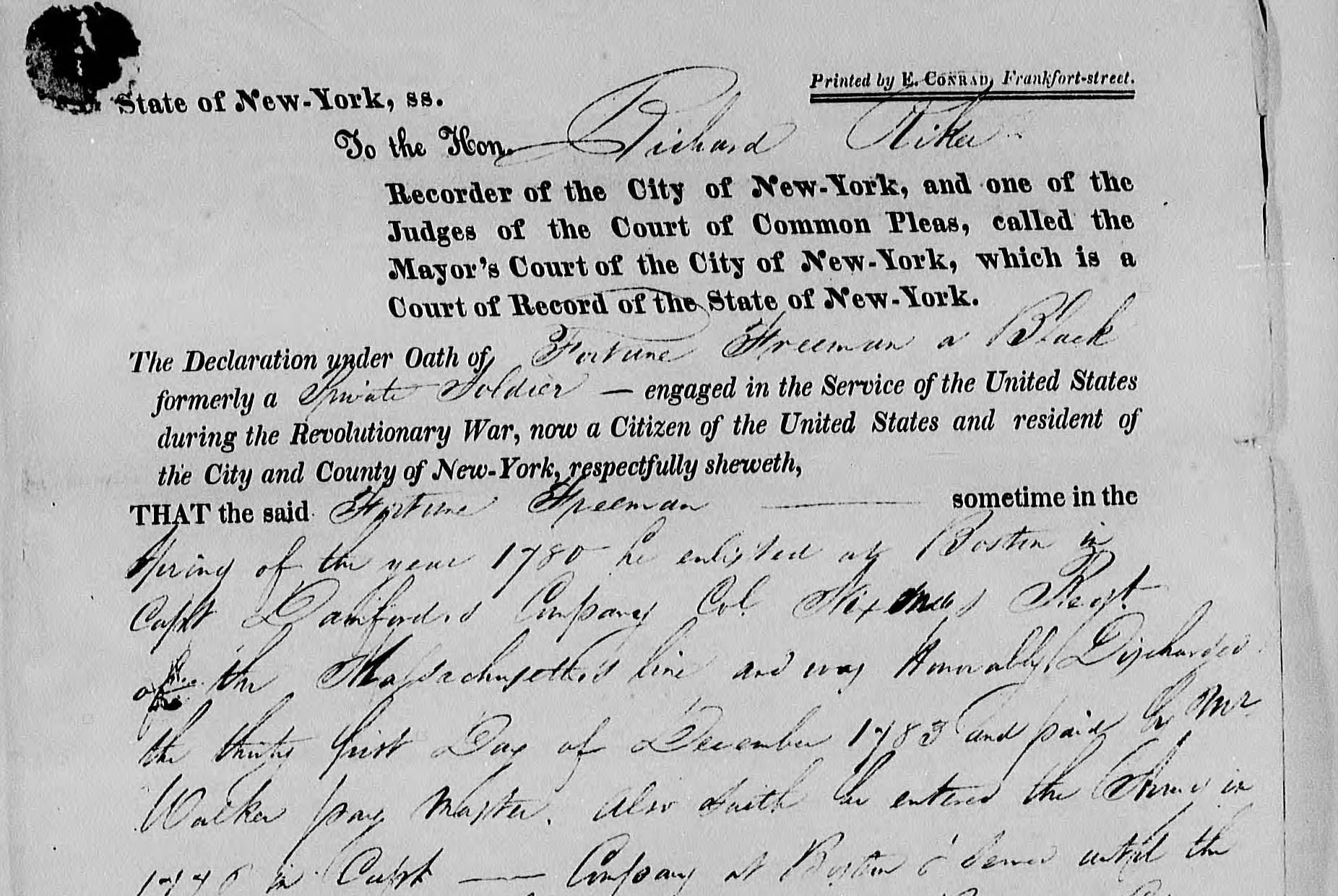The Mysteries of Fortune Freeman
Earlier this year Boston National Historical Park shared a research article by Anjelica Oswald about an African-American Revolutionary War pensioner. It starts with this scene:
In Fortune Freeman’s case, his memories didn’t match the remaining paper trail in several ways.
Freeman also testified to having been wounded at the Battle of Brandywine and to witnessing the surrender of Gen. John Burgoyne at Saratoga. Those two major battles took place in the same season hundreds of miles apart, so no army units were at both.
Freeman’s pension application thus shows some of those gaps and contradictions. However, Oswald also found that in May 1777 Col. James Barrett mustered a Billerica man named Fortune (or “Forten”) Conant into Capt. Danforth’s company. This man served in that Massachusetts regiment until 1780. Then there’s no further record of him.
But there is a record of a man named Fortune Freeman enlisting into the 4th Massachusetts regiment in 1781 and serving until the end of the war two years later. Those details matched the discharge paper Freeman presented with his pension application decades later.
Oswald’s essay explores the likelihood had Fortune Conant and Fortune Freeman were the same man, with some details dovetailing, others (like his later commanding officer) left aside, and a few (either Brandywine or Saratoga) embellished.
It also uses the record of the units Conant and Freeman were linked to, and later civilian records, to fill in the big holes of his/their life. Was Fortune Conant born enslaved, perhaps to the Conant family of Billerica? Did Fortune Freeman return to Massachusetts after being discharged? The U.S. government continued to pay his pension until 1824, so is that when this veteran died? The article is a detailed read, careful to distinguish evidence from supposition.
In the spring of 1818, an old man named Fortune Freeman…swore to the court that he served as a soldier in the Revolution, and applied for a veteran’s pension for some relief. Arriving to the court with merely the clothes on his back, Freeman provided few details about his personal life in his statement. Aside from his own declarations, few records of his life exist before or after the war. Only one of these precious few records remained in his possession when he approached the court: a discharge paper from the 4th Massachusetts, issued to him at the close of the Revolutionary War in 1783.Because many veterans similarly lacked paperwork, and because the U.S. War Department had suffered a fire in 1800, the pension process for aging Revolutionary War veterans relied on applicants’ memories. That makes the pension files detailed historical sources but also leaves them riddled with gaps and contradictions.
In Fortune Freeman’s case, his memories didn’t match the remaining paper trail in several ways.
Freeman claimed to have first enlisted in Boston in 1776 in Captain Elijah Danforth’s company, Colonel Thomas Nixon’s regiment, later designated the 6th Massachusetts Regiment in 1779. He stated that he continued to serve in the same regiment until his honorable discharge in 1783. However, when looking through muster rolls, there is no record of a “Fortune Freeman” enlisting in 1776 in Danforth’s company. In fact, there is no record of a “Fortune Freeman” in Danforth’s company at all.Capt. Danforth was from Billerica, serving from the first day of the war. But he left the army in March 1779. So whom commanded Fortune Freeman after that?
Freeman also testified to having been wounded at the Battle of Brandywine and to witnessing the surrender of Gen. John Burgoyne at Saratoga. Those two major battles took place in the same season hundreds of miles apart, so no army units were at both.
Freeman’s pension application thus shows some of those gaps and contradictions. However, Oswald also found that in May 1777 Col. James Barrett mustered a Billerica man named Fortune (or “Forten”) Conant into Capt. Danforth’s company. This man served in that Massachusetts regiment until 1780. Then there’s no further record of him.
But there is a record of a man named Fortune Freeman enlisting into the 4th Massachusetts regiment in 1781 and serving until the end of the war two years later. Those details matched the discharge paper Freeman presented with his pension application decades later.
Oswald’s essay explores the likelihood had Fortune Conant and Fortune Freeman were the same man, with some details dovetailing, others (like his later commanding officer) left aside, and a few (either Brandywine or Saratoga) embellished.
It also uses the record of the units Conant and Freeman were linked to, and later civilian records, to fill in the big holes of his/their life. Was Fortune Conant born enslaved, perhaps to the Conant family of Billerica? Did Fortune Freeman return to Massachusetts after being discharged? The U.S. government continued to pay his pension until 1824, so is that when this veteran died? The article is a detailed read, careful to distinguish evidence from supposition.


No comments:
Post a Comment